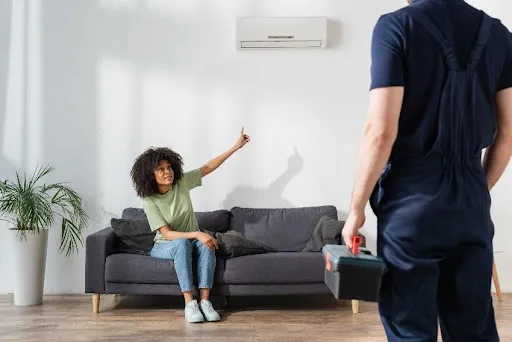There’s no sound quite as sweet as your trusty air conditioner kicking on during a sweltering Midwest summer day. That gentle hum lets you know relief from the heat and humidity is on the way. But when your cooling companion starts making clunks, screeches, or other unseemly rackets? Houston, we’ve got a problem.
Weird noises coming from AC units are more than just annoyances – they’re often the first signs that something’s amiss under the hood. From a minor hiccup to a major meltdown waiting to happen, that clanging, squealing, or banging could hint at anything from a loose part to a complete system failure.
The tricky part is pinpointing exactly what those grumbles and groanings mean for your unit’s health. Is it just a temporary quirk that’ll resolve itself? Or are you facing expensive repairs or replacements if the root cause doesn’t get addressed ASAP? No one wants to be caught flat-footed when temperatures spike into the miserable 90s.
Have no fear, though – this guide is here to help you decipher your AC’s cry for attention! We’ll cover all the common cacophonies these systems make when they’re struggling, from high-pitched whistles to basement-rattling booms. Once you can diagnose the likely troublemaker, we’ll walk through some basic DIY fixes for minor issues, but also explain when it’s wisest to wave the white flag and call a pro.
Because at the end of the day, the last thing any Indiana or Ohio homeowner needs is their cooling oasis turning into a disruptive industrial noise complaint. A little preventative know-how goes a long way toward keeping your AC humming smoothly all summer long!

Understanding Normal AC Noises
Before we dive into the weird and unruly sounds, it’s helpful to understand what qualifies as “normal” noise from your air conditioning unit. Knowing the standard acoustic baseline makes it easier to detect when things have truly gone rogue.
For starters, don’t expect your AC to operate in total silence. These hardworking systems have lots of mechanical components whirring away to provide that crisp, cooled air. A gentle, steady humming as the compressor runs and air handlers circulate is perfectly natural.
You’ll also hear the intermittent kicking on and off as your unit cycles through its regular cooling sequences. That brief blast of air upon startup, followed by quieter background operation, is par for the course. Units located in attics or against the home’s exterior may also transmit some degree of vibration or resonance.
What you don’t want to hear are abrupt, disruptive noises or sounds that ramp up in volume over time. Clanks, grinding, or high-pitched squeals signal that something’s definitely awry. Hisses and gurgles can indicate air or refrigerant leaks too. Essentially, any sudden changes from that expected murmur mean it’s time to lend an ear and investigate.
Get familiar with your AC’s unique “normal” soundtrack when it’s operating properly. Once you can distinguish baseline noise from abnormal racket, you’ll be able to catch potential issues early before minor quirks escalate into bigger blowouts. A little acoustic awareness goes a long way!
Common Types of Weird AC Noises and Their Causes
Now that you’ve got a handle on your air conditioner’s standard soundtrack, it’s time to decipher what those head-scratching clamors and clanks could possibly mean. Odd sounds offer crucial audible clues that something in your system needs attention before bigger problems develop. Let’s tune in to some of the most frequent AC offenders:
Banging or Clanking
When your cooling kick-starts with a bang or repeating clunks, chances are you’ve got a loose component causing a major ruckus. Things like bent fan blades smacking against their housings or a loose compressor panel will trigger that cringe-worthy racket. Left unfixed, that banging motion can quickly escalate from annoying to outright damaging other parts of the unit.
Buzzing
A buzzing almost resembles an angry beehive taking up residence inside your AC cabinet. While it may not be as jarring as bangs and clanks, that constant fuzzy drone signals electrical issues. Potential culprits include a failing compressor or fan motor on its last leg. But sometimes buzzing can be due to minor issues like loose electrical connections that just need tightening.
Clicking
You know that clicking sound a light switch makes? Multiply that by a rapid, incessant pitter-patter and your AC has gone haywire. Frequent clicking typically stems from an electrical relay issue that’s constantly turning parts on and off when it shouldn’t. But it can also indicate obstacles like debris jamming up fan blades while they attempt to spin.
Squealing or Screeching
Is your air conditioner haunted? Because that hair-raising screech sure sounds like something from a horror film! While ghosts aren’t the likely culprit, a squealing noise definitely indicates major mechanical drama. The most common cause is a failing blower motor bearing.
As those tiny bearings wear out over years of use, they make a racket when the blower tries spinning up. Worn belts on belt-driven motors can squeak severely too when they’ve lost their grip. Either way, screeching demands prompt repairs before it leads to full motor burnout.
Humming
Now, we mentioned earlier that a baseline humming is perfectly normal AC white noise. But an excessively loud, pervasive humming that overpowers the typical gentle hum? That’s a red flag that something’s amiss in your system’s electrical components.
Humming can signal issues like a failing compressor that’s struggling to start properly and drawing excess voltage. It can also indicate a dual capacitor problem preventing the condenser fan from getting enough juice. Don’t ignore loud humming – it often precedes costlier electrical failures.
Rattling
That haunting rattle might have you checking for a haunted appliance! While no spectral entity is present (we hope), rattling can indeed stem from spooky internal looseness. Anytime you hear an incessant rattle-y rumble from the cabinet, it likely means something has come unbolted or disconnected.
Common culprits include dislodged blower fans, loose panels or coverings, and disconnected motor housings jangling around. Excessive cabinet vibration can also be the source of screws and bolts working themselves loose. Get that rickety ruckus silenced fast before components start self-destructing!
Hissing
That ominous hissing sounds like the prelude to an airborne predator locking in on its target. In the case of your AC system, that sibilant noise is likely caused by one of three troublemakers – refrigerant leaks, airflow obstructions, or pressure issues. A leak in the refrigerant lines will produce an unmistakable hissing as that precious chemical escapes.
But hissing can also stem from blocked return-air ducts forcing excess air pressure that’s venting out somewhere. Or it might hint at a more serious refrigerant leak or blockage causing rapid pressure drops in the compressor itself. No matter the root cause, any detectable hissing demands immediate diagnosis before bigger damage results.
Whistling
While a jaunty whistle might sound cheery coming from a songbird, it’s anything but happy coming from your AC components. That shrill, whistling whine is basically an SOS signal that airflow is heavily restricted somewhere in your system.
It could be from grimy air filters forcing air to squeeze through tight spaces at high speeds. Or it might trace back to collapsed ducting or obstructed vents creating air choke points. In any case, the whistling indicates dangerously high pressure levels building up – never a good sign long-term if left alone. Stop and locate the source of that strangled airflow issue ASAP.
At the end of the day, any persistent noises that seem out of the ordinary for your AC warrants further investigation. While some quirks might be no-biggie minor fixes, others act as an early warning system for much costlier problems festering. Staying alert to weird clanks, hums, and whistles provides a chance to fix root issues before they turn into a maintenance nightmare down the road.
Diagnosing the Problem
Once you’ve got an idea of what kind of noise your AC is making, it’s time to investigate and try to identify the source. With some careful inspection work, you may be able to pinpoint the culprit yourself. Here’s a rundown on tracking it down:
- Safety First – Before proceeding, be sure to shut the unit off completely from its power source – either the circuit breaker or disconnect switch. Attempting to troubleshoot while the system is still live can be extremely dangerous with electrical components involved.
- Conduct a Walkthrough – Give both the indoor and outdoor AC units a thorough visual top-to-bottom inspection. Look for any loose panels, disconnected parts, or physical damage that could potentially contribute to abnormal sounds.
- Check Air Filters – When was the last time you replaced the air filters? If they’re severely clogged with dust and debris, it forces the system to work harder pushing air through, likely causing groaning, whistling, or other noises. See if installing fresh filters helps quiet things down.
- Listen Closely – With the AC turned off, place your ear near different components like the compressor, blower motor, and any area where the noise seems most pronounced. You may detect fainter sounds that could reveal the issue, such as bearing rumbles or grinding.
- Hands-On Testing – For certain parts, careful hands-on testing may be required. Try gingerly spinning the blower fan by hand to check for roughness in the bearings. Inspect belts to ensure proper tension. You could even lightly tap components with a tool to see if the sound changes or stops.
The key is to take it slowly, be observant, and know when to call in professional help for anything that seems hazardous or beyond your abilities. If you’ve exhausted basic troubleshooting without success or encounter potential electrical or refrigerant issues, there’s no shame in requesting an HVAC technician’s expertise. Sometimes bringing in trained pros is the wisest solution.
DIY Solutions for Minor Noise Issues
If your noise sleuthing has uncovered fairly straightforward causes like loose hardware or dirty components, you may be able to resolve those pesky rackets through some simple DIY steps. Don’t be too intimidated by tackling minor AC maintenance yourself – with proper precautions, many noise fixes are well within reach for the average homeowner. Let’s review some common situations lending themselves to DIY remedies:
Tightening Loose Parts
One of the most frequent culprits behind rattling, clanking, and general cabinet cacophony? You guessed it – loose screws, bolts, panels, or housings that have gradually worked themselves free over years of operation and vibration. Annoying as that incessant rattling might be, the fix can be as easy as giving everything a thorough tightening during your next AC tuneup.
Just be sure to shut off all power sources first for safety. Then carefully remove any exterior covers or panels to expose all the component hardware within. Use a socket wrench to cinch down any noticeable loose nuts and bolts securing parts like blower assemblies. You may even want to add a dab of Loctite or thread adhesive to really lock those fasteners in place. The same goes for any unsecured panels or housings – securely re-fasten them to stop that infernal rattling.
Cleaning and Maintaining the AC Unit
When was the last time your AC system got a proper deep cleaning and TLC? If it’s been years since those coils and fans got a thorough degunking, built-up grime is the likely source of any whirring, grinding racket you’ve been enduring. Dirty components simply can’t operate at peak quiet efficiency.
Start by carefully brushing and vacuuming away any visible dirt, dust, or debris buildup around the indoor air handler unit, coils, and blower assembly. Use a soft brush and HEPA vacuum hose attachment to avoid pushing gunk deeper inside. You can also invest in AC coil foam cleaners to dissolve stubborn grimy deposits. Once everything looks fresh and clean, replace air filters and make sure all parts can move freely again without interference.
For outdoor condenser units, trim away any overgrown vegetation crowding the unit and clear away fallen leaves or yard debris. Using compressed air can then blast heavier dirt out from between condenser fins and fan blades.
Replacing or Lubricating Parts
If your troubleshooting has isolated an issue like worn bearings or slipping fan belts, parts replacement is the only surefire fix. Fortunately, these are relatively straightforward DIY jobs assuming you have access to proper HVAC components through a local supply house. Just be sure to carefully follow all manufacturer guidance to size and install new parts accurately.
For instance, to replace a squeaky blower motor bearing assembly, you’d need to first cut all power sources, and then carefully remove the motor housing. The new bearing slides in once the old worn part is removed and properly lubricated. For replacing a loose belt, ensure the new one meets the spec for your system’s recommended tension and length. Then readjust motor mounts or idler pulleys to properly align the new belt.
Some lubrication can provide stop-gap relief too. Got a squeaky metal blower assembly? A spritz of lithium grease on moving components like fan shaft bearings can temporarily quiet the racket until you can properly replace any failed parts.
Between tightening loose hardware, degunking built-up filth, and swapping out aging components, many annoying AC noises are well within reach for a dedicated DIYer to fix themselves. Just be sure to exercise proper safety precautions around electrical components and refrigerant lines. And know when to wave the white flag on repairs better left to pros!
Professional Solutions for Persistent Noise Issues
Let’s be real – some AC noises are just way too stubborn or over your head as a homeowner to keep messing with. If you’ve tried the basic DIY fixes but that shrieking, clanking, or buzzing won’t quit, waving the white flag on professional help is probably wise. Here are some cases where you’ll want to call in the pros:
Electrical Shenanigans
Any suspicious humming, buzzing, or rapid clicking sounds screaming “electrical issue!” at you? Unless you’re an electrician yourself, best leave those to trained HVAC techs. It could indicate problems with capacitors, control boards, wiring, and other components you really don’t want to risk YouTubing a fix for. One amateur move and you’re looking at a potential fire hazard!
Compressor Calamities
If noises seem to be coming from the compressor or refrigerant lines themselves – like hissing, high-pitched shrieking, or an outright rattling compressor – get the experts involved ASAP. That likely points to a complex internal issue with compressor valves, overcharged refrigerant, or other problems only a certified tech can properly diagnose and repair without creating an environmental hazard.
Vintage System Showtunes
Maybe your old-timer of an AC unit has been diligently maintained, but it’s still putting on a whole musical for you with clanks, squeaks, and whistles galore. At some point, continued patchwork repairs just aren’t cost-effective anymore compared to upgrading to new, quieter HVAC equipment installed by professionals.
Air Handler Hysteria
If those loud, high-pitched, hair-raising noises seem isolated to just the indoor air handler cabinet, it’s probably not something to DIY unless you really know what you’re doing. Blower motors, bearings, and electrical components in there can produce a real horror show of sounds when they start failing in advanced ways.
The bottom line is any abnormal noise coupled with loss of heating/cooling performance, weird odors, visible refrigerant leaks, etc. means it’s time to call in trained backup. Your ears alone can only diagnose so much – let the pros with their tools and experience pin down the real root cause so you’re not just chasing ghosts forever!
Stop Losing Sleep Over Noisy AC Shenanigans – Call Bassett!
Let’s face it – losing your cool over strange AC noises is no way to spend summer in Indiana or Ohio. Between rattles keeping you up at night and shrieking compressors driving you batty, those disruptive sounds are more than just annoyances. They’re often the first signs that your cooling system needs major professional attention.
Why risk letting minor quirks spiral into costlier breakdowns and replacements? With decades of HVAC experience, the certified experts at Bassett Services have seen and heard it all. Their technicians utilize the latest diagnostic tools to accurately pinpoint noise gremlins, from electrical issues and refrigerant leaks down to worn bearings and blown compressors.
More importantly, they’ll shoot you straight on the best repair or replacement solutions for your specific situation – no upselling, no gimmicks. When your system’s a lost cause, Bassett handles top-to-bottom AC installations and can size you with the perfect energy-efficient new unit to keep things whisper-quiet for years.
Their skills are backed by straightforward pricing, outstanding warranties, and customer service that treats you like family. Because Bassett understands – dealing with AC racket on top of summer heat is the last thing any Indiana or Ohio homeowner needs.
Reclaim your peace (and peace of mind!) by enlisting the area’s most trusted HVAC noise experts at Bassett Services. Give their team a call at (317) 360-0054 and rest easy knowing your AC woes are in skilled, professional hands.





